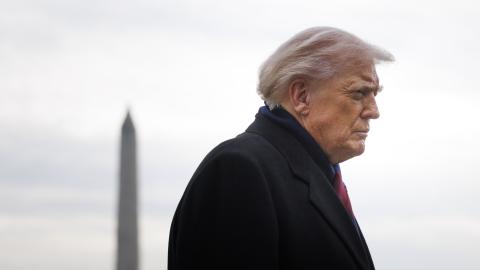In 1991 the political world was rocked by the unlikeliest of victories. Harris Wofford, a former aide for John F. Kennedy, upset two-term Republican Governor Richard Thornburgh in a special election to fill the seat of the late Pennsylvania Senator John Heinz. Wofford was guided to his victory by a little-known campaign manager named James Carville, who told him to make a bold and unequivocal case for "universal health care." Wofford's underdog victory left the GOP shell-shocked.
Fast-forward 19 years: it is the Democrats who are now faced with divining the results of another underdog's victory. In January, a little-known state senator named Scott Brown defeated Massachusetts Attorney General Martha Coakley in a special election for the United States Senate. Universal health care was once again on center stage. This time around, though, the Republican seized on widespread antipathy to what has come to be seen as an incoherent Democratic scheme for an unworkable federal takeover of health care.
The unlikely victory not only defied the odds of a Republican winning in Democrat-owned Massachusetts; Brown's ascent also put him in the storied seat of the liberal lion Ted Kennedy. Before Brown, no Massachusetts Republican had won a Senate election since Edward Brooke in 1972; no Republican presidential candidate had secured Massachusetts's electoral votes since Ronald Reagan in 1984; even more striking, the Bay State had not sent any Republicans to the House of Representatives since 1996. However, beyond the mere realization of an improbable data point, this special election called into question much of the received political wisdom of the past 20 years. Brown's victory directly contradicted the liberal claims that Democrats own the health-care issue and that comprehensive reform is popular. As a candidate, Brown ran on a platform promising to serve as the health-care roadblock he instantly embodied on being elected.
In fact, the Brown election can be seen as the closing of the door on a two-decade era in which Democrats, Republicans, and most of the political class came to believe that the Democrats possessed an inherent electoral advantage on the health-care issue. The history of the past 20 years reveals two Democratic presidencies, first Bill Clinton's and now Barack Obama's, upended by health care, whereas a single administration—that of a Republican, George W. Bush—benefited from it. In 2004, Bush was able to secure a narrow re-election victory in part because of his success in securing a form of targeted health-care reform through the creation of a Medicare prescription-drug benefit.
The combination of Democratic wishful thinking and an American electorate suspicious of the intentions of those pushing relentlessly for an ever greater government involvement in health care has proved a ballot-box disaster for Democrats. How did this happen? And why?
_____
Before the Wofford win, health care was not an obligatory issue in congressional campaigns. But the recession of late 1989-91, which served to increase the number of uninsured from 31 million in 1987 to 35 million in 1991, a 13 percent rise, made voters anxious about the prospects of losing health coverage. Wofford seized on this anxiety and found that his opponent had no effective response. Thornburgh went from being 40 points ahead to suffering a 10-point loss on Election Day.
While health care was certainly an important part of the Wofford win, it is not clear exactly how central its role was. Interest in the race developed too late for pollsters to organize exit polls, which would have better determined what motivated Pennsylvania's voters. Nonetheless, the election instantly became part of political lore. For liberals across America, it was a giant-killer moment in which health care was the murder weapon. As Ted Kennedy put it, "Harris Wofford's dramatic victory makes clear that the American people want comprehensive health care reform, and they want it now."
Democrats entered into the 1992 election cycle with renewed optimism, eager to wield health care as an issue once again. Carville ascended to a senior position in Bill Clinton's campaign against the incumbent president. Like Thornburgh, the first President Bush had once appeared unbeatable but had become undeniably vulnerable. Clinton, promising an improved economy and a vaguely defined system for "universal coverage," defeated Bush, with the anti-trade, anti-deficit Ross Perot playing a major spoiling factor in a third-party candidacy that received nearly 20 percent of the vote. Clinton's "New American Health Care Plan," remarkably similar to the promises Barack Obama would make 16 years later, sought to
cover everybody. Control costs, improve quality, expand preventive and long-term care. Maintain consumers' choice of doctors. Take on the insurance companies and the medical bureaucracy, and demand reform.
Even so, polls showed that voters ranked health care behind both the economy and the deficit in importance. Nonetheless, Bill Clinton entered office believing that he had a mandate to overhaul the nation's health-care system. The legislative conduct he backed in 1993 and 1994 should look eerily familiar to observers of the current debate: the overwhelming moral certainty, the secret deliberations, the hardball tactics, the question of whether to use the Senate reconciliation process to get around rules giving that body's minority the power to block the legislation's forward movement, the initial questions among Republicans of whether to get aboard a moving train or stand against the proposals, and complaints from the Left about the slowness of the process. At one point in 1994, the first lady, Hillary Clinton, who was serving as head of the Task Force on National Health Care Reform, gave a forceful speech to liberal activists in which she criticized them for seeking "parochial victories," warning that "you'll end up with no bill being passed—or a bill so weak the president will veto it."
And as is true about the Obama plan, the more the public learned about the Clinton health-care reform and its cost (for the nation and for themselves), the less they liked it. According to Harvard polling expert Robert Blendon, support for the Clinton plan fell from 70 percent to 43 percent over the course of a year. As public support dropped, Republican flirtations with reform, especially among liberal Republican senators like John Chafee and Bob Packwood, diminished, and opposition hardened. Furthermore, Senate Republican leader Bob Dole, with an eye on the 1996 presidential nomination and recognizing that his perceived openness to a bipartisan compromise weakened his own shot at the nomination, became a staunch critic.
Despite a bold State of the Union promise from the president—"If you send me legislation that does not guarantee every American private health insurance that can never be taken away, you will force me to take this pen, veto the legislation, and we'll come right back here and start all over again"—and comfortable Democratic majorities in the House and the Senate, Clinton failed to get a vote on his plan in either the House or the Senate before the 1994 midterm elections. It would prove to be his last chance to secure a health-care overhaul.
In 1994, up for re-election, Senator Harris Wofford served as a bellwether once again, but of a different kind. Having once foreshadowed Clinton's win, Wofford now served as a leading indicator of Clinton's political weakness. Katharine Seelye wrote in the New York Times that Wofford was so weighed down by Clinton and his health-care plan that his staffers "prepared a four-page, single-spaced list of 'significant Wofford/Clinton policy differences.'?" Wofford failed in his 1994 re-election bid, as Democrats lost a total of eight Senate seats and 54 House members.
_____
While the high political hopes of Democrats and liberals for moving toward a government-engineered health-care system over the past two decades have mostly surpassed their successes, Republicans have for the most part kept some distance from the issue. One exception to this was George W. Bush, who made it an important aspect of his 2000 presidential campaign. Despite the general sense that Medicare, the universal health-care guarantee for the elderly, and all the political benefit to be gained from it belonged to the Democrats, Bush saw an opening in 2000 and promised to "set [Medicare] on firm financial ground and make prescription drugs available and affordable for every senior who needs them.''
The Bush campaign was attempting to mitigate a particular Republican vulnerability in regard to seniors. When Medicare was first created in 1965, doctors and seniors did not rely on pharmaceutical products as part of a daily regimen as much as they do today. But by 2000, pharmaceutical products had become increasingly important in extending and improving the lives of older Americans. As seniors saw that Medicare did not cover these products, they became increasingly angry and began to mobilize politically. As every politician knows, seniors show up and vote in much higher percentages than do their younger cohorts. Over the years Democrats had seized on this issue, simply making senior pharmaceutical products part of their standard wish list.
By embracing the creation of a prescription-drug plan to be administered through Medicare, Bush saw an opportunity to undercut Democratic attacks; and from a political perspective, he succeeded. In the 2000 election, he ended up within four points of Al Gore among seniors, eight points better than Bush's father had scored against Bill Clinton in 1992. Moreover, to the extent that backing the new Medicare benefit was part of his compassionate-conservative persona, the plan helped Bush capture the all-important middle ground with voters across the age spectrum.
Even though leaders of both parties supported the idea, passage of the Medicare Modernization Act was not an easy endeavor. Some on the Right worried about the huge cost of expanding the Medicare entitlement and about the wisdom of a new entitlement altogether. On the Left, most Democrats worried about both the individual-choice elements Bush wanted to inject into the program and the political danger of allowing Republicans to take credit for succeeding in a traditionally Democratic policy area.
Passage of the bill in Congress in 2003 turned into an unsightly spectacle, as Republicans, who then controlled the House, in contravention of all past practice, held open the final vote until they could secure, through scandalous promises and frank political blackmail, enough votes from skeptical conservatives. Bush touted the bill's passage as one of his biggest accomplishments. The success paid political dividends for his re-election campaign. Bush beat John Kerry by seven points among those 60 and over in 2004, and by three points among those 65 and up.
In addition to the Medicare change, Bush also promoted a number of smaller, market-based initiatives that did not make headlines but did help push the country toward a more consumer-based, value-driven system. As part of the Medicare Modernization Act, he created health-savings accounts, which allow individuals to save tax-free for medical expenses. He championed consumer choice through innovations such as Hospital Compare, an online resource that allows consumers to weigh the quality and price of procedures at different hospitals. He also pledged that half of all Americans would have access to electronic medical records by 2014. None of these initiatives was as ambitious as those proposed by Clinton before him or Obama afterward, but they were designed to lay the groundwork for future market-driven reform by encouraging saving and improving access to information.
Perhaps more crucially, Bush did not upset the nation's larger health-care equilibrium. Since Medicare's passage in 1965, there has been an understanding—among the American people if not always its leaders—that the government would help seniors, poor people, and those with disabilities attain health-care coverage, but that the rest of the country would secure private health insurance. As a result of this sharing of responsibilities, the percentage of total health spending coming from government has, while growing, thus far remained under 50 percent.
Attempts by politicians on either side to upset this balance are likely to generate accusations of "privatization" from the Left or charges of "creeping socialism" from the Right. Bush's more targeted approach kept him from affecting the balance, but it also limited the scope of his ability to improve the system.
_____
It appeared to Barack Obama and his dramatic majorities in the House and Senate that the balance was ready to be upset in 2009. Ted Kennedy had been championing a nationally managed universal system since the late 1960s, and the Senate Health, Education, Labor and Pensions (HELP) committee, long chaired by Senator Kennedy, had designed the Senate's legislation in the spring. The bill was then sent to the Congressional Budget Office (CBO) for an independent assessment of its cost. The CBO quickly determined that the Kennedy bill would cost $1.3 trillion over 10 years and would cover only 16 million people. At a time when President Obama was bemoaning the problem of 46 million uninsured people in America, the news that $1.3 trillion would cover only one-third of them seemed like a lousy deal. The American people, who had been understandably tempted by the siren call of Obama's cry for a health-care overhaul that would somehow cover a huge number of the uninsured while simultaneously reducing costs, began to have second thoughts. This skepticism was exacerbated by the continuing financial meltdown, which reminded Americans that perhaps we could not afford to have it all.
The CBO produced many more health-care scores of different proposals throughout 2009. Price tags were similarly gasp-inducing, and none of its findings mitigated the initial and accurate impression that the taxpayer would be spending in the range of a trillion dollars for the various plans, which would require the majority of Americans to be contributors to, rather than recipients of, government largesse.
With the realization that the plans would not "bend the cost curve down," as the president had promised, it became clear that Democrats were not likely to achieve bipartisan consensus, or even bipartisan cover, on the issue. As a result, the Democrats decided to press their main advantage—their large working majorities in the House and Senate. The House numbers were so substantial that Democratic leaders felt free to allow their most vulnerable members to defect from the key vote—and 39 did. The House health-care bill passed in November with only 220 votes.
In the Senate, this approach required maintaining the 60-vote filibuster-proof majority, secured in July when Al Franken was sworn in as junior senator from Minnesota. And it was just as quickly lost when Kennedy died in August. In the race to fill his seat with a pro-health-care vote, Democrats were desperate to ensure that the rules governing Senate elections in Massachusetts worked to their advantage. In fact, they surpassed blatancy and entered into shamelessness. In 2009, with Democratic Governor Deval Patrick in power, the state legislature reversed a policy it had put in place only four years earlier and returned to the governor the power to appoint a temporary Senate replacement until a special election could take place. The old Kennedy hand Paul Kirk filled the liberal lion's seat.
During the same period, a rash of unseemly health-care horse-trading among Senate Democrats came to light. Chief among the offenses was the "Cornhusker kickback" for Senator Ben Nelson of Nebraska. In return for Nelson's vote—necessary to push the $871 billion bill through a unified GOP opposition—Democrats vowed that the federal government would pay for the entirety of Nebraska's expanded Medicare coverage. In addition, Senator Joe Lieberman's stance against the public option opened him up to a new and hostile round of disparagement. Both the ugliness of the ensuing fight and the airing of the Democrats' unapologetic swap meet served to further animate the electorate against a federally run health-care program. However, if a pro-health-care Democrat won in Massachusetts, it would ensure a 60th vote for passage, allowing Democrats to bypass a filibuster.
As this was happening, Scott Brown traversed the state and pounded his opponent, Massachusetts Attorney General Martha Coakley, on her support for the Democratic health-care proposals. Brown insisted that he would be the "41st vote" against the Senate's attempts to reconcile its bill with that of the House, going so far as to say that he was "the only person who can stop the debate on this monstrosity of a health-care bill and make them go back to the drawing board." His opposition resonated with voters far more than Coakley's promise to be a reliable vote in favor of the bill.
Just as the Wofford win revealed a decline in popularity for George H.?W. Bush in 1991, the Brown win revealed a decline in Obama's, with consequences yet to be determined.
_____
To be sure, our health-care system is flawed: the U.S. spends far too much and gets too little, and far too many people lack coverage or are concerned about the expense or the long-term inability to secure coverage. Despite the fact that America's doctors, nurses, and medical innovators are the finest in the world, our delivery and allocation systems are defective, leading to an inefficient and expensive distribution of care. Our current spending patterns are unsustainable, and both Medicare and Medicaid are headed toward insolvency. Recognition of the problem and agreement with President Obama's approach are vastly different things, but the existence of a crisis is beyond dispute.
Without a clear and cohesive way forward, the American people seem willing to live with the current, inefficient arrangement, in which most people are in the private market, while the poor, disabled, and elderly get Medicaid and Medicare. One lesson of the Brown election is that attempts to push too far in any one direction will likely generate a voter counterattack. Anyone who wants to change the system will have to get bipartisan cover in order to make real changes.
There are, however, alternatives to the expensive and cumbersome approach promoted by the Democrats thus far. Some proposals, if packaged in a smaller bill, could potentially secure bipartisan support. Although President Obama has recognized physician complaints regarding the high cost and perverse incentives generated by an uncontrolled medical--malpractice system, he has until now been unwilling to accept the well-reasoned position that punitive damages should be capped. Another proposal, long promoted by Republicans, is to expand the insurance market by allowing individuals to purchase insurance across state lines. A third idea, the expansion of high-risk pools, would help individuals with pre-existing health conditions secure insurance policies. The point is not that Democrats and Republicans agree substantially about these issues right now but that these are matters for both parties to talk about.
Unfortunately, while the Brown election has upset Obama's plans in the short term, it has not caused the Democratic leadership in Congress and the White House to question whether they are right on either the merits or the politics of the health-care issue. The merits can be debated endlessly, but this review of the past two decades indicates the foolhardiness of Democratic certainty regarding health care's political advantages. Not only do Republicans have the ability to play in the health-care arena, but the recent debates have also further diminished the American people's faith in the Democrats, both on the issue itself and on the larger question of profligate government spending.
As we get deeper into 2010, Barack Obama seems reluctant to unburden himself of what must be an exasperating dilemma for a politician so given to lengthy address: his explications have only served to make Americans more mistrustful of a dysfunctional health-care takeover. Indeed, two decades of debate have delivered a strangely elusive verdict: the promise of a comprehensive health-care overhaul is not a winning tactic for Democrats. Nor, for that matter, could it ever be one for Republicans. All we do know is that discrete measures, ones that hone in on this or that flaw in the health-care system, have the inestimable value of being widely palatable—and, not incidentally, achievable.



















